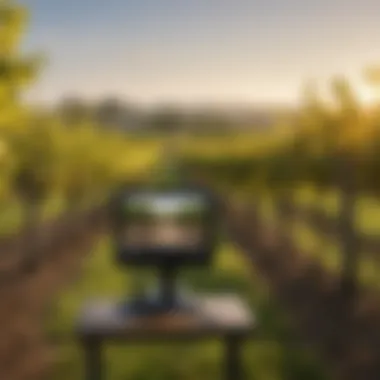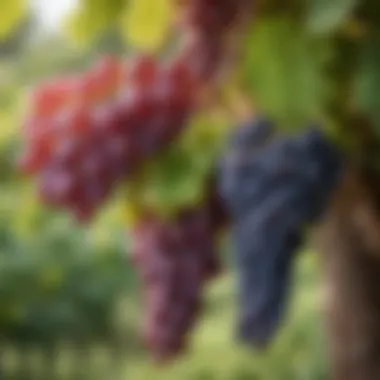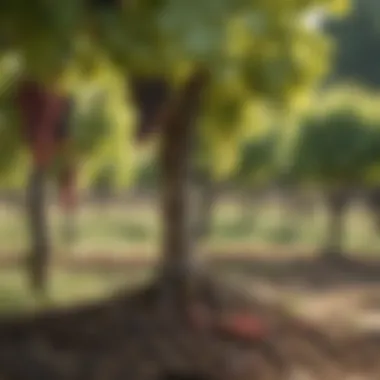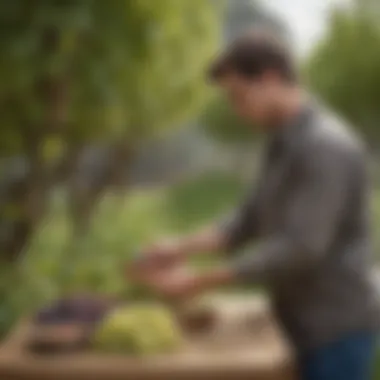Understanding Online Viticulture Classes for Aspiring Growers


Intro
Online viticulture classes have gained significant attention in recent years. Their popularity reflects an evolving educational landscape, where traditional learning methods intersect with digital innovation. This shift is crucial for those interested in grape cultivation and winemaking, offering accessible pathways to knowledge for beginners and seasoned professionals alike.
As the global wine industry continues to grow, there is an increasing demand for skilled viticulturists. Understanding the various offerings in online viticulture education can be daunting. An insightful examination of key concepts, prevalent trends, and distinct platforms aids potential students in making informed choices. In doing so, it is essential to navigate the practicalities of these courses, identifying their structure, benefits, and overall relevance to today's viticulture.
Through this article, we aim to provide a coherent framework that outlines the core aspects of online viticulture classes. We will focus on how these courses are structured, elaborate on the benefits they offer, and detail key educational platforms, course content, and industry insights that enhance learning. This comprehensive overview is intended to guide aspiring viticulturists on their journey toward excellence in a field that is increasingly embracing digital methodologies.
Prolusion to Viticulture Education
In the modern era, viticulture education stands as an essential discipline for those pursuing careers in winemaking and grape cultivation. Its significance is amplified in an increasingly digital landscape where accessibility to knowledge is paramount. Online viticulture classes have emerged as crucial platforms for individuals seeking to deepen their understanding of this intricate field. These classes allow learners to engage with nuanced content right from their homes, making it possible for a wider audience to explore a range of viticultural topics.
Defining Viticulture
Viticulture is the science and art of grape growing. This encompasses various practices, from selecting suitable grape varieties to understanding environmental conditions, ensuring successful cultivation. Grape growing is not merely about planting vines; it involves a complex relationship with the land, climate, and ecosystem. Understanding these dynamics is essential for anyone aspiring to excel in this industry. The integrity of the grapes grown directly impacts the quality of wine produced, making viticulture a cornerstone of the winemaking process.
Importance of Online Learning in Viticulture
Online learning is revolutionizing viticulture education. It offers significant advantages that traditional classroom settings cannot match.
- Accessibility: Online courses can be accessed by anyone with an internet connection, breaking down geographical barriers. Students from remote areas can now tap into world-class educational resources.
- Flexibility: Learners have the liberty to schedule their studies around personal or professional commitments. This adaptability accommodates varying lifestyles.
- Diverse Content Delivery: Online classes often integrate various learning materials, including video lectures, reading assignments, and interactive forums, providing a well-rounded educational experience.
The shift towards online education enhances the reach and feasibility of learning about viticulture.
Key Features of Online Viticulture Classes
Online viticulture classes have distinct characteristics that make them appealing in today's educational environment. These features enhance learning and facilitate a more efficient way to acquire viticulture knowledge. As more people express interest in grape cultivation and winemaking, understanding these key features becomes vital.
Interactive Learning Experiences
Interactive learning is an essential feature of online viticulture courses. It encourages active participation through quizzes, discussions, and simulations. This hands-on approach enables learners to engage with materials in a meaningful way. This engagement fosters deeper understanding and retention of complex topics. Learners can also collaborate with peers, gaining diverse perspectives on viticultural practices.
In traditional settings, interaction is often limited to classroom discussions. Online courses, however, utilize various platforms to facilitate real-time communication. This aspect is important, as networking is a crucial part of the viticulture industry.
Flexible Scheduling Options
Flexibility is one of the most attractive aspects of online viticulture classes. Learners can choose when and where to study. This option is particularly beneficial for working professionals or those with busy schedules. Rather than adhering to fixed class times, students can engage with the material at their own pace. This not only enhances convenience but also allows for individualized learning experiences.
Moreover, this adaptability can lead to better course completion rates. Students may find it easier to balance their education with other responsibilities, reducing stress associated with rigid timing.
Diverse Learning Resources
Online viticulture classes often provide a variety of resources that cater to different learning styles. This diversity is critical for fostering an inclusive learning environment. Some key types of resources include:
Video Lectures
Video lectures serve as a dynamic tool for delivering complex information. They break down intricate processes, such as fermentation and grape growing techniques, into digestible visual segments. Students can revisit these videos whenever needed, reinforcing their understanding. This repeated exposure helps to solidify concepts in a way that text alone may not achieve. On the downside, some learners prefer reading over watching, which can reduce effectiveness for certain individuals.
Reading Materials
Reading materials complement video content by providing in-depth explanations and theoretical frameworks. These materials often include academic articles, textbooks, and case studies, which are fundamental for comprehensive learning. Their structured presentation guides learners through the essential concepts with clarity. However, excessive reliance on reading can be overwhelming without proper guidance or summarization techniques.
Online Forums
Online forums cultivate community and facilitate knowledge sharing. Learners can ask questions, share insights, and provide support to one another. This communal aspect is particularly valuable in a subject as nuanced as viticulture. Participants can exchange experiences and challenges they face, enriching their learning experience. A possible drawback is that not all contributions will be equally credible, so discernment is necessary.
"The combination of various learning resources, from video lectures to online forums, creates a well-rounded educational experience that caters to individual learning preferences."


In summary, the key features of online viticulture classes are not only crucial for education but also play a significant role in shaping the overall learner experience. The interactivity, flexibility, and resource diversity present clear advantages to aspiring viticulturists.
Curriculum Overview of Online Viticulture Courses
The curriculum of online viticulture courses is vital to the learning process for those interested in grape cultivation and winemaking. A well-structured curriculum ensures that participants obtain comprehensive knowledge and hands-on skills necessary for success in the viticulture industry. Specific elements within the curriculum help learners to gain insights about viticulture principles, soil management, pest control, and the significance of various grape varieties. Moreover, the systematic approach allows individuals to engage progressively, taking fundamental principles into account and building upon them throughout their studies.
Fundamentals of Grape Growing
The section on grape growing fundamentals lays the groundwork for any aspiring viticulturist. Here, students learn about the essential components of vine biology, including photosynthesis, growth cycles, and the physiological needs of grape vines. The understanding of different grape varieties, their typical characteristics, and climatic requirements is significant for making informed decisions in vineyard management. This foundational knowledge allows learners to appreciate why certain methods work for specific grapes, in particular environments. Moreover, it helps them understand yield variations and how to achieve desired outcomes.
Soil Science
Soil science forms an essential part of viticulture education. A vineyard’s health depends much on its soil composition and quality. Students discover the intricacies of soil types, pH levels, and nutrient availability. Knowledge in soil management practices equips graduates with the ability to enhance or remediate soil conditions for optimal growth. They also learn how soil affects grape flavor profiles, which can influence the final product. By actively engaging in this segment, learners get acquainted with sustainable practices that promote soil health, an increasingly important aspect in modern viticulture.
Pest and Disease Management
The management of pests and diseases is a critical aspect of grape growing. This subsection prepares students to identify, prevent, and control common vineyard threats. It covers various techniques, from integrated pest management to organic control methods. Understanding the life cycles of pests and recognizing the early signs of diseases allows for timely interventions, minimizing crop losses. Knowledge of such practices contributes to healthier vineyards, which subsequently results in improved grape quality.
"A strong emphasis on curriculum coherence enables learners to cultivate their knowledge and skills effectively."
Choosing the Right Online Viticulture Class
When it comes to pursuing online viticulture education, the decision on which class to take can feel overwhelming. The fluidity and vastness of the digital landscape offers numerous choices. However, choosing the right course is essential for those serious about advancing their knowledge and skills in viticulture. Factors to consider include accreditation, instructor qualifications, and student feedback. Making a well-informed decision can significantly affect not only your learning experience but also your future career opportunities in the wine and grape industry.
Accreditation and Certification
Accreditation holds significant weight in online education. It ensures that the institution offering the course meets specific standards of quality and reliability. Many students overlook this factor when selecting their classes. But, attending an accredited program can instill confidence in the knowledge gained.
Certificates from recognized institutions can enhance your professional credibility in the viticulture field. Employers often look for candidates who have completed programs certified by reputable agencies. As a result, it is prudent to verify the accreditation status of any online viticulture course before enrolling. Check if the institution is recognized by organizations such as the American Society for Enology and Viticulture or other local regulatory bodies.
Instructor Credentials
Alongside accreditation, the qualifications of instructors are paramount. The expertise and experience of the instructors directly influence the quality of education provided. Look for teachers who have practical experience in the field, such as professionals who have worked in well-known vineyards or have contributed to significant research projects in viticulture.
Having a diverse faculty profile can also enrich the learning environment. Instructors with backgrounds in various viticulture aspects ensure a comprehensive curriculum. Therefore, reviewing the instructors’ qualifications, experiences, and areas of expertise can be beneficial.
Course Reviews and Testimonials
Assessing course reviews and testimonials can serve as a reliable gauge of program effectiveness. Personal accounts from past students can reveal vital insights regarding course content, teaching methods, and overall satisfaction. Often, these reviews highlight strengths and weaknesses not immediately apparent from course descriptions.
Look for reviews on reputable platforms such as Reddit or the institution’s social media pages. Pay attention to feedback regarding the responsiveness of instructors, the availability of resources, and post-course support. A course with numerous positive reviews typically indicates a good learning environment.
"The quality of online viticulture education often directly reflects the value of the certificate you will earn. Choose wisely."
In summary, selecting the right online viticulture class cannot be overstated. Accreditation, instructor qualifications, and course reviews are crucial factors. Rigorous analysis of these elements will guide you toward making an educated choice, ultimately enriching your journey in the fascinating world of viticulture.
Benefits of Online Viticulture Education
Online viticulture education offers numerous advantages for individuals interested in grape cultivation and winemaking. The shift towards virtual learning has allowed many to explore this field without the constraints typically associated with traditional education. This section highlights key benefits, focusing mainly on accessibility for diverse learners and a cost-effective approach to obtaining viticulture knowledge.
Accessibility for All Learners
Accessibility stands as one of the most significant advantages of online viticulture classes. These courses break geographical barriers, allowing students from various locations to access quality education. Whether a person is in a rural area or an urban center, they can find programs tailored to their needs.
In traditional educational settings, travel requirements or local availability can hinder access to viticulture studies. Online platforms eliminate these obstacles, bringing expertise from experts in the field directly to aspirants' screens.
The flexibility of online classes also allows learners to integrate studies with other life commitments. Parents, professionals, or anyone with a busy schedule can complete courses at their preferred pace, choosing specific hours that fit into their daily routines. This adaptability makes it easier for a broader audience to pursue their interests in viticulture without sacrificing other responsibilities.


Cost-Effectiveness
Another notable benefit of online viticulture programs is cost-effectiveness. Enrolling in traditional courses can be financially burdensome. Tuition, commuting, accommodation and materials can quickly add up. In contrast, online studies often have lower tuition fees and fewer additional costs.
Moreover, many online courses provide materials digitally, eliminating the need to purchase expensive textbooks. This accessibility tends to reduce overall expenses, making education more attainable.
Finally, the potential return on investment is worth considering. Many successful graduates of online viticulture education find promising career opportunities that validate their choice of study. The industry's growth and the increasing demand for skilled professionals mean that investing in online education can yield significant future benefits for graduates.
By harnessing the power of technology, online viticulture education opens doors for keen learners, democratizing access to this essential knowledge.
Overall, the advantages of online viticulture education are evident. Accessibility and cost-effectiveness ensure that aspiring viticulturists can pursue their passions and advance their careers without undue barriers or financial stress. This shift in education shapes the future of viticulture as a field, enabling it to thrive in the digital age.
Challenges of Online Viticulture Courses
Online viticulture courses offer distinct advantages, but they also come with specific challenges. Understanding these challenges is critical for prospective students. They can impact the quality of learning and the overall experience. By acknowledging these issues, learners can prepare better and adapt as needed.
Lack of Hands-On Experience
One major drawback to online viticulture education is the limitation in providing practical, hands-on experience. Viticulture is inherently a tactile field. It involves physical tasks such as pruning vines, managing soil, and harvesting grapes. These activities are vital for grasping how theoretical knowledge translates into real-world practices. Without physical interaction with the vines, students may struggle to fully understand the processes involved in grape cultivation.
Choices to address this issue vary. Some online programs incorporate field trips or partnerships with local vineyards. These arrangements can help bridge the gap created by distance education. Virtual simulations also exist, but they may not fully replicate the feeling of being in an actual vineyard. Students should actively seek programs that provide opportunities for as much hands-on experience as possible.
Self-Motivation Requirements
Online viticulture courses require a high level of self-motivation from students. In a traditional classroom, instructors often guide students, setting expectations and deadlines. However, in online learning, individuals must manage their time effectively and stay committed to their studies. Some learners might find this format challenging, leading to procrastination or disengagement.
Success in online viticulture education often hinges on personal discipline and goal-setting. Students must set aside dedicated time for learning and stick to that schedule. Additionally, it helps to create a structured environment. This could mean setting up a designated study area or using planners to track progress. The ability to remain focused and motivated can significantly affect the outcome of one's education.
"The effectiveness of online learning in viticulture, or any discipline, is often determined by the learner’s engagement and drive."
Overall, the challenges associated with online viticulture courses should not deter learners. By recognizing the two highlighted facets: hands-on experience limitations and self-motivation requirements, students can better prepare themselves for a successful educational journey.
Real-World Applications of Online Learning
The relevance of real-world applications in online viticulture courses cannot be overstated. These classes transcend traditional education by offering practical exposure to the industry. Aspiring viticulturists gain not only theoretical knowledge but also insights applicable to real-world challenges.
Industry Connections and Networking
One of the most significant benefits of online viticulture classes is the ability to form industry connections. By participating in these courses, students become part of a broader network of professionals, educators, and fellow learners. Networking feeds into several aspects of a viticulturist’s career.
- Collaborative Opportunities: Students can engage in collaborations and projects with peers, often leading to innovative practices in grape cultivation and wine production.
- Mentorship Access: Many online classes feature industry experts who serve as instructors or guest speakers. This connection can open doors to mentorship and invaluable advice tailored to specific career paths.
- Professional Associations: Participating in online viticulture education often provides access to various professional forums, such as the American Society for Enology and Viticulture, where students can see connections in action.
Such opportunities create a mutually beneficial relationship. On one hand, learners gain knowledge and contacts; on the other, industry professionals stay updated with fresh perspectives.
Career Advancement Opportunities
Online viticulture classes pave the way for increased career advancement. As the field evolves, staying abreast of modern techniques and trends is vital. Here are several ways these online courses impact one's career trajectory:
- Skill Development: Participants enhance their skill set through diverse learning modules, such as pest management techniques or soil science. With enhanced skills, graduates become more attractive candidates to employers.
- Certification Possibilities: Many online programs offer recognized certifications. These credentials can significantly enhance a resume and provide a competitive edge.
- Job Placement Programs: Some institutions have dedicated services to help graduates secure employment. These programs may include job fairs or direct introductions to wineries looking for new talent.
Evaluating Course Outcomes
Evaluating course outcomes is a crucial step for those interested in online viticulture classes. It allows potential students to gauge the effectiveness and relevance of the programs in meeting their educational and career goals. Understanding how these classes translate into practical skills and job readiness is essential.
Success Stories of Graduates
One significant way to assess the effectiveness of online viticulture classes is through the success stories of graduates. Alumni often share their experiences and transformations after completing their courses. Many have moved on to impactful careers in the wine industry, leveraging what they learned through their studies. Their narratives can provide insight into the practical application of course content and illustrate the potential for career advancement.


Graduates have reported various roles, such as vineyard managers, consulting for wineries, or even starting their own wine labels. Some notable success stories include individuals who transitioned from unrelated fields into viticulture after taking online courses. This can reflect well on the course’s ability to equip learners with the knowledge and skills necessary in a competitive job market.
Employability and Job Placement Rate
Another important aspect of evaluating online viticulture classes is looking at employability and job placement rates. These metrics reveal how effectively a course prepares students for the job market. Programs that maintain strong relationships with industry players often experience higher placement rates. This is due to the networking opportunities and internships these courses may offer.
Factors to consider when reviewing employability include:
- Industry connections: Programs with robust connections can facilitate job placements and internships.
- Career services: Courses that offer resume reviews and interview preparation support can enhance employability.
- Alumni networks: Active alumni can open doors for new graduates, providing them insights into job openings or mentorship opportunities.
A solid understanding of the employability factor can significantly impact a student’s decision-making process when selecting an online viticulture course.
Future Trends in Viticulture Education
The landscape of viticulture education is evolving rapidly, influenced by technological advancements and a growing awareness of sustainability. As more individuals seek knowledge in grape cultivation and winemaking, understanding these trends becomes essential. Online classes accommodate a diverse range of learners, allowing them to connect with modern practices and tools within the viticulture sector. This section outlines key factors shaping the future of viticulture education.
Emerging Technologies in Education
Technology plays a crucial role in transforming education. In the realm of viticulture, online learning platforms are incorporating various tools to enhance the learning experience. Virtual reality (VR) and augmented reality (AR) are being explored as effective ways to teach hands-on skills without requiring physical presence in vineyards. For instance, VR can simulate vineyard scenarios, allowing students to practice decision-making in a risk-free environment.
Moreover, data analytics is gaining traction in viticulture education. Students learn to analyze data regarding soil health, climate conditions, and yield predictions. Understanding these metrics is vital for modern winemaking and grape production. Furthermore, mobile applications are increasingly supporting students, offering on-the-go access to resources and tools. These apps can provide real-time updates on grape cultivation practices, pest management, and more.
The Role of Sustainability in Viticulture
Sustainability is not merely a buzzword; it represents a growing commitment to responsible farming practices in viticulture. Online courses are now integrating sustainability topics into their curricula. Students are taught about organic farming, biodynamic practices, and sustainable winemaking techniques. This is essential, as consumers are increasingly making environmentally conscious choices.
The inclusion of sustainability content prepares students to meet industry demands for eco-friendly practices. It ensures they understand the importance of aligning vineyard management with ecological principles. Additionally, knowledge of sustainability equips them to tackle challenges posed by climate change, making them valuable assets to potential employers.
"Sustainable practices in viticulture not only protect the environment but also enhance the quality and marketability of wines."
The future of viticulture education is characterized by innovation and sustainability. Understanding these trends enables aspiring viticulturists to adapt and thrive in a competitive industry. As technology advances and environmental awareness grows, the way wine is produced and learned will continue to transform.
Epilogue: Navigating the Path Forward
In the realm of viticulture education, the conclusion serves as a pivotal segmentation that encapsulates the essence of what has been learned. It is not merely an ending, but a critical reflection on the journey through online viticulture classes. As we navigate the intricate path of grape cultivation and winemaking, understanding how to integrate the knowledge gained is of utmost importance. This article has illuminated various factors contributing to the efficacy of online viticulture courses.
By synthesizing theoretical knowledge with practical application, learners are encouraged to experiment and innovate in their practices. The closure of is an invitation to reflect on the knowledge acquired, urging viticulture enthusiasts to think critically about how they can apply techniques and principles in real-world settings. The actionable insights provided by online platforms can reshape grape-growing practices and enhance one's contribution to the industry.
Moreover, the continuous evolution of the online learning landscape allows for ongoing engagement with current knowledge. Engaging with advancements not only enhances one's skills but proves beneficial in understanding industry trends and shifts that can impact viticulture.
Integrating Knowledge and Practice
Integrating knowledge and practice is essential for success in viticulture. As one becomes more adept in understanding the scientific principles behind grape cultivation, the ability to translate these concepts into practical applications becomes crucial.
One effective approach is fostering a hands-on mindset, where learners take initiatives to apply theoretical lessons in real-life scenarios. This can be achieved through:
- Participating in local workshops
- Conducting small-scale experiments
- Networking with industry professionals
Such activities solidify the theoretical concepts learned and expose learners to the realities of viticulture, making them well-rounded practitioners.
Commitment to Lifelong Learning
The world of viticulture is not static, and neither should one's knowledge be. A commitment to lifelong learning is vital for both personal and professional growth. The pursuit of education should not end after completing a course; rather, it should evolve into a continuous quest for knowledge.
Online viticulture classes provide a foundation, but remaining engaged with emerging trends, technological advancements, and critical discussions in forums is fundamental. This can be achieved by:
- Reading industry publications
- Participating in webinars
- Joining online viticulture communities
The learning journey is ongoing. Viewing education as a perpetual endeavor ensures one remains informed and responsive to changes affecting viticulture practices.
"Adopting a mindset of lifelong learning transforms challenges into opportunities for improvement and innovation."
In summary, navigating the path forward in viticulture requires a deliberate integration of skills and knowledge along with a firm commitment to continuous learning. The ultimate goal is to foster an environment where growth and expertise flourish, contributing positively to the viticulture landscape.















